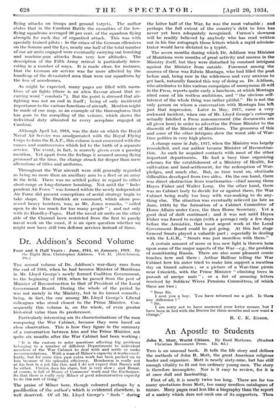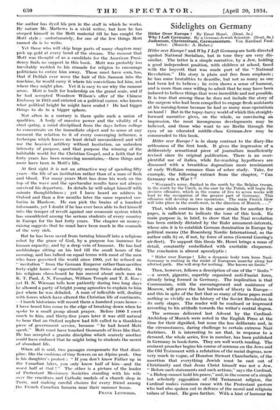An Apostle to Students THIS is an unusual book. It
tells the life story and defines the methods of John R. Mott, the great American religious leader and organizer. Mott is nearly sixty-nine, but has still
enough vitality to fit out ten ordinary young men. The story is therefore incomplete. Nor is it easy to review, for it is at once dull and fascinating.
First of all, it is nearly twice too long. There are far too many quotations from Mott, too many needless catalogues of names. Many. pages read less like a biography than the report of a society which dare not omit one of its supporters. Then
the author has dyed his pen in the stuff in which he works. By nature Mr. Mathews is a vivid writer, but here he has steeped himself in the Mott material till he has caught the Mott style ;—unfortunately, for one of the few things Mott cannot do is to write.
' Yet those who will skip large parts of many chapters may pick up gold at every bend of the stream. The rumour that Mott was thought of as a candidate for the American Presi- dency finds no support in this book. Mott was probably too inevitably wedded to his crusade for religion to encourage politicians to entice him away. Those must have seen, too, that if Delilah ever wove the hair of this Samson into the machine, he would carry it 'where his convictions led him, not where they might plan. Yet it is easy to see why the rumour arose. Mott is built for leadership on the grand scale, and if he had accepted Woodrow Wilson's offer of the Chinese Embassy in 1913 and entered on a political career, who knows What political height he might have scaled ? He had bigger things to do in a bigger sphere.
Not often in a century is there quite such a union of qualities. A body of massive power and the vitality of a steel spring, a mind disciplined from the days before college to concentrate on the immediate object and to sense at any moment the relation to it of every converging influence, a technique which leaves no' least detail unconsidered and will use the heaviest artillery without hesitation, an unbroken intensity of purpose, and that purpose the winning of the habitable world for the Christian Gospel, and a faith that for forty years has been removing mountains,—these things and more have been in Mott's life.
At first sight it is not an attractive way of spending fifty years—the life of an institution rather than of a man of flesh and blood. For many .years Mott has done his work on the top of the wave and the spectacular results have not always survived his departure. In details he will adapt himself with minute thoughtfulness ; yet I have heard an address in Oxford and then a few months later the same repeated ver- batim in Hankow. He can pick the brains of a hundred informants, yet I doubt if he has ever been able to feel himself into the temper of revolt against our economic system which has smouldered among the serious students of every country in Europe for the last forty years. The chapter on money- raising suggests that he must have been much in the counsels of the very rich.
But he has been saved from turning himself into a religious robot by the grace of God, by a purpose too immense for human capacity, and by a deep vein of humour. He has had archbishops sitting on his bed till the small hours of the morning, and has talked on equal terms with most of the men who have governed the world since 1900, yet he refused an
invitation " from the German Emperor rather than sacrifice forty-eight hours of opportunity among Swiss students. On his religious chess-board he has moved about such men as K. T. Paul, J. N. Farquhar, William Temple and T. Z. Koo ; yet H. N. Wieman tells how patiently during two long days he allowed a party of bright young agnostics to explain to him just where he was deluded. A man of inflexible will, dealing with forces which have altered the Christian life of continents, —Church historians will record them a hundred years hence— I have heard him come to the edge of breaking down when he spoke to a small group about prayer. Before 1900 I owed much to him, and thirty-five years later it was still natural to hear that an Oxford nephew had felt called to a thankless piece of government service, because " he had heard Mott speak." Mott must have touched thousands of lives like that. He has accepted a granite discipline which scarcely another could have endured that he might bring to students the secret of abundant life.
When all is said, two passages compensate for that disci- pline, like the cushions of tiny flowers on an Alpine peak. One is his daughter's protest : " If you don't know Father up in the Canadian lakes, you only know half of him—and the worst half at that ! " The other is a picture of the leader of Protestant Missionary Societies standing with his wife over the crucifixes and Catholic medals of- a church shop in Turin, and making careful choices for every friend among .the French Canadian farmers near their summer home.
FnAmi LENWOOD,













































 Previous page
Previous page